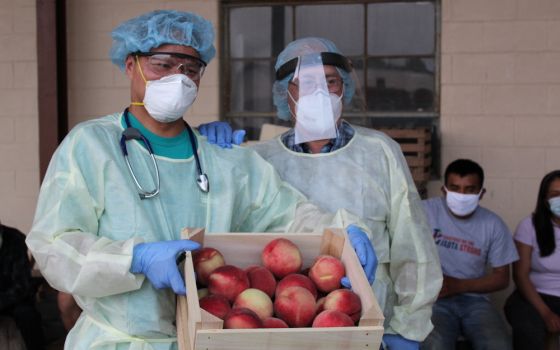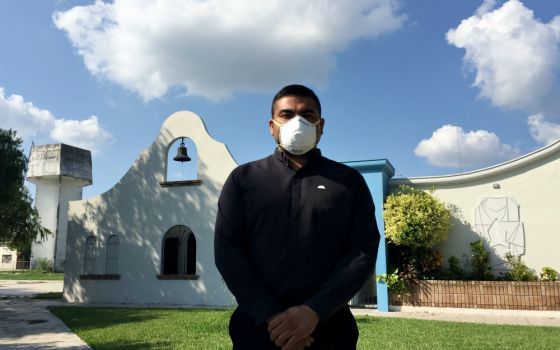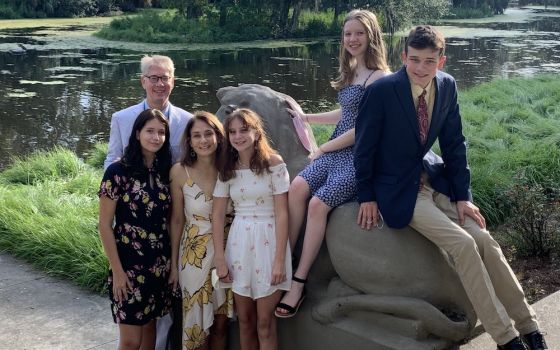A man covers his face with his shirt as he waits to receive goods from volunteers during food and water distribution in Accra, Ghana, April 4, during the COVID-19 pandemic. (CNS/Reuters/Francis Kokoroko)
Bongani Nompembe started having serious complications after suddenly relapsing from a mental health condition that her caregivers had been managing well. She needed to go to the local hospital in South Africa — the country hit hardest on the continent by the coronavirus pandemic, with nearly 590,000 cases — but was turned away as the facility was only dealing with COVID-19 cases.
Her caregivers feared for the worst as a prolonged relapse could have dire consequences.
The doctors' worries for Nompembe resonate with those for millions of others living with or recovering from mental health conditions across Africa, where health systems are under severe strain amid the pandemic.
Although the South African Federation of Mental Health said it did not yet have data showing how COVID-19 has impacted the mental health of South Africans, one of its leaders told NCR it is seeing a "lot more people reaching out for help" during this time.
Masutane Modjadji, project leader for information and awareness at the foundation, said in an email interview that one of the care facilities the group works with has recorded a five-fold increase in contact with mental health professionals since President Cyril Ramaphosa imposed lockdown measures in March.
Modjadji described Nompembe's story. (NCR is using a different name to protect this person's identity.)
The project leader said this person was eventually able to find care at a hospital, "but her daughter was not allowed to speak to the health care workers to explain her mother's medical history."
Advertisement
From Cape Town in South Africa to Bangui in the Central African Republic, Catholic relief agencies, priests and mental health experts are having to double up their efforts as a result of the increased number of Africans seeking help for mental health conditions. COVID-19 related depressions, anxieties and bipolar disorders have added to the situation, with many experts seeing an increase in mental health trends across the continent.
"The phrase 'COVID-19 is deadly' is heard daily on the radio, TV and other social media means," said Fr. Henry Saindi, secretary general of Malawi's bishops' conference. "Death is threatening and this arouses anxiety, restlessness [and] paranoia in many people."
Augustine Fr. Aaron Prosper Kuubagr, a representative with the Ghana Psychological Association (GPA), told NewsWatch Ghana Aug. 13 that more than half a million of the West African country's 30 million citizens are "suffering from severe mental disorders" while 2.1 million other Ghanaians are currently suffering from moderate to mild mental disorders.
"The GPA is aware levels of anxiety, fear, isolation, social and physical distancing, restrictions, uncertainty, and emotional distress have become widespread as the world struggles to bring the coronavirus under control," he said as the group launched the Ghana Psychology Week Celebration under the theme: Making psychology relevant to the Ghanaian, before, during and after COVID-19.
Catholic Relief Services (CRS) is focusing more on mental health programs in countries where they have a presence, including Zimbabwe and the Central Africa Republic.
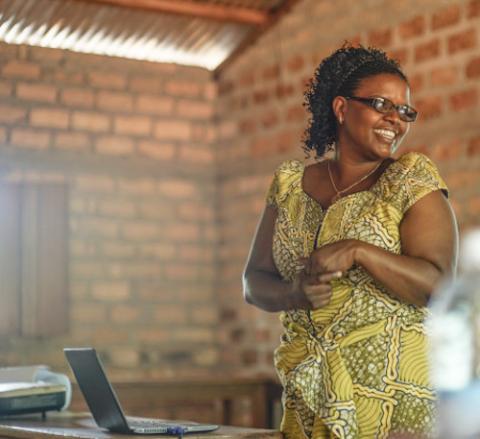
Florence Ntakarutimana, a Catholic Relief Services program manager (CRS/Zack Baddorf)
Florence Ntakarutimana, CRS' program manager for mental health, said that in the Central African Republic the pandemic is weighing on the social fabric and "has compounded many existing and ongoing challenges across the region."
"In CAR, there were already widespread feelings of trauma, distrust, hopelessness and anger," said Ntakarutimana, who is based in the country.
Although the Central African Republic's government signed a peace deal last year with 14 armed rebel groups, violence is once again on the rise in the country.
"There has been a resurgence in armed group activity in some parts of the country, causing displacement and deepened suffering among the population [while] gender-based violence also weighs heavily on mental health in Africa and particularly in CAR," said Ntakarutimana.
The challenges with mental health across Africa are not limited to patients but also extend to caregivers and psychologists working with them, Jacinta Maritim, a psychologist intern at Kenya's Psychiatric Disability Organization, explained in a recent blog post.
"COVID-19 burnout is one of the issues therapists are facing in their line of work" as they are getting "drained emotionally, physically and mentally due to the overwhelming nature of the work they do," wrote Maritim.
Voice of America reported July 28 that Kenya's mental health task force estimated that 25% of the country's outpatient population and 40% of in-hospital patients suffer from mental health issues such as depression.
The task force said that from every family of five people, "at one point or another, one of them in their life will suffer from mental illness."
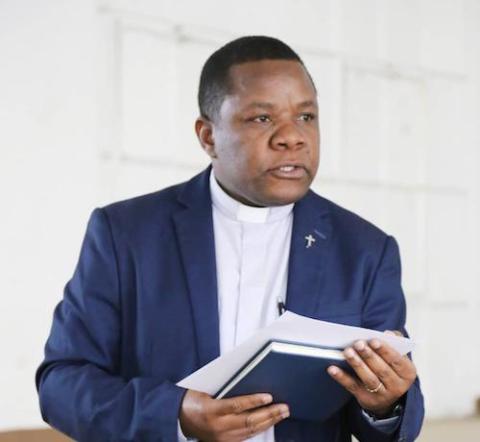
Fr. Henry Saindi, secretary general of Malawi's bishops' conference (Provided photo)
Despite mental health increasingly becoming a challenge across Africa, Catholic priests and agencies are working on some solutions that they expect to yield gains in handling and addressing mental disorders, especially as the pandemic rages on.
Saindi, secretary general of Malawi's bishops' conference, noted that infection cases and deaths arising out of the novel coronavirus are on the increase and that bishops and priests in the country are stepping up to offer messages of hope, helping to care for the sick and also starting to offer "tele psycho-social pastoral counseling on a weekly basis using radio and other social communication."
"We are offering professional counseling services through a call-in service including referral for one-on-one counseling," said Saindi.
Rita Billingsley, country representative for CRS in Zimbabwe, said the organization is helping provide remote mental health support in the country. Because of a spike of familial abuse cases during the pandemic, she said the agency is also partnering with child protection agencies and shelters to offer safe spaces for those who need them.
Noreen Kudzanai Wini Dari, a community psychologist and president of the Zimbabwe Psychological Association, said that there is growing integration between psychology and religion, with faith-based organizations now realizing that mental health is a condition that requires expert care and attention.
Dari noted that faith organizations also play a key role in social support for people with mental illness through their family and community programs.
"Although they are not psychologists … they understand the basis of human behavior, and this makes it easier for them to refer people with mental health conditions for professional care and attention," she said.
People wearing protective masks and staying apart from each other pray during Mass in late July at the Cathedral Basilica of the Holy Family in Nairobi, Kenya, during the COVID-19 pandemic. (CNS/Reuters/Thomas Mukoya)
[Tawanda Karombo is a business and financial technology journalist based in Harare, Zimbabwe, with more than 10 years of experience covering sub-Saharan Africa.]





